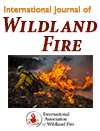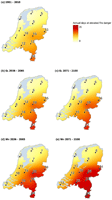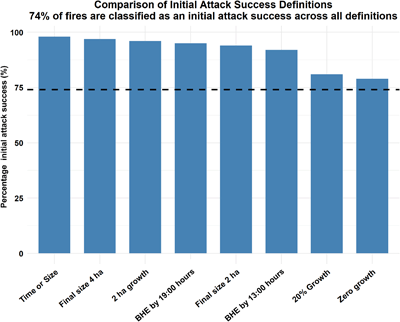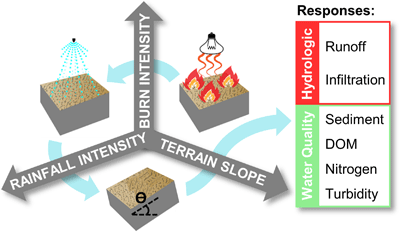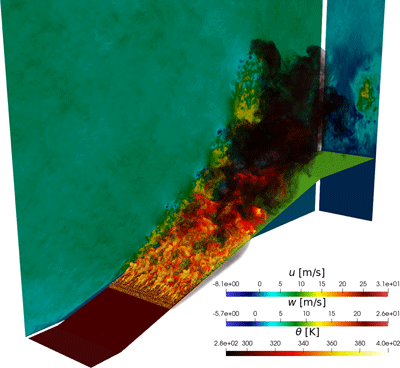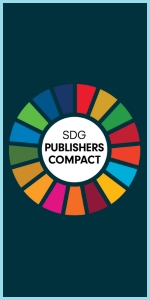International Journal of Wildland Fire
Volume 33
Number 12 2024
In an Australian tropical savanna, soil microbial abundance was more affected by burn season than fire frequency. Grass and litter cover reduced microbial abundance; modern grasses had a greater impact on microbes than ancient endemic species. Soil organic carbon and coarse-scale microbial community structure were unaffected by fire regime.
This article belongs to the collection: Savanna burning.
Terrain-induced turbulence is dangerous for smokejumpers parachuting into complex terrain. We evaluate WindNinja and find that the model can be useful as an aid in identifying safe jump spots in complex terrain. Findings from this work will reduce parachute accidents and increase the safety of aerial firefighter operations.
Novel data sources were used to measure how recreation was influenced by fuels reduction efforts under the US Forest Service Collaborative Forest Landscape Restoration (CFLR) Program. Visitation to the CFLR landscapes changed at a rate mirroring the trend observed elsewhere. Pre-commercial thinning and pruning had slight positive influences on visitation, whereas prescribed burning and managed wildfire had slight negative influences. We did not find any wholesale changes by fuel treatments within CFLR landscapes.
In the context of increasing extreme wildfire events due to climate change, understanding how to manage our forests is crucial for protecting ecosystems and communities. This study developed a comprehensive framework that combines habitat restoration with fire hazard management, showing that integrating stakeholder input can significantly reduce fuel loads in forests. By modifying forest cover types, the approach not only allows lowering wildfire hazard while potentially fostering habitat conservation, serving as a valuable tool to assist decision-makers in forest management.
We review the challenges and solutions for managing savannas in the Lower Mekong region, focusing on fire regimes, misclassification and mapping difficulties. Emphasising a balance between community socioeconomic needs and biophysical conditions, we recommend sustainable savanna management through holistic, community-based fire management, integrated landscape planning and further exploration of incentivisation for avoided emissions.
This article belongs to the collection: Savanna burning.
Large wildfires are increasing across the eastern United States. Quantifying the risk to human life and property is imperative. We find large wildfires burn disproportionately in areas with high housing density but increases in the number of large wildfires have occurred in more remote areas with low housing density.
Developing effective participatory community-based governance is recognised as a key challenge in delivering equitable and sustainable outcomes for Indigenous communities in market-based carbon and ecosystem services projects.
This article belongs to the collection: Savanna burning.
Our study looked at past elevated fire danger days, but also at how it will change in the future in the Netherlands using meteorological data, the Canadian Fire Weather Index and Dutch climate scenarios. We find that fire danger has increased already and will continue to do so in the future.
This article belongs to the collection: Fire and Climate.
We used statistical modelling and machine learning to model the probability of initial attack (IA) success for eight different time and size-based definitions. We found no substantial differences in model predictive accuracy across the different definitions. Models of IA success should be defined using specific research or operational objectives.
This study presents mapped fires in Canada from 1972 to 1983 created from Landsat MSS imagery. The fire maps integrated into the annual NBAC time series provide long-term insights of fire trends in Canada’s forests.
An assessment scale for the forest fire workers recruitment process in Turkey was created and its validity and reliability evaluated. Twenty-three criteria were identified across five factors through confirmatory factor analysis. The calculated goodness-of-fit indices for the CFA model indicated a strong model fit to the observed data.
Laboratory-scale experiments simulated varying burn intensities, revealing nuanced changes in soil physical properties and chemical composition with increased heating levels. Burn effects on water quality and supply were observed independently and in combination with rainfall intensity and terrain slope.
We modelled wildfire activity in wildland–urban interface areas of Sardinia, Italy by applying a set of predictive models to investigate how climatic, vegetation, zootechnical, and socio-economic drivers influence wildfire ignitions and area burned. Wildfire patterns at WUI were strongly affected by socio-economic factors and by herbaceous vegetation.
This work presents an efficient ensemble simulation platform for landscape-scale wildfire simulations with physical representation of the combustion. We conducted high-fidelity simulations spanning 117 different wind speeds and slopes combinations. The fire spread and intermittency behaviour is studied, with an analysis of the plume- and convection-driven fire regimes.
To increase the collection of fire information, this paper integrates deep learning techniques and digital image processing methods, creating a model with enhanced feature extraction capabilities for early forest fire detection.


